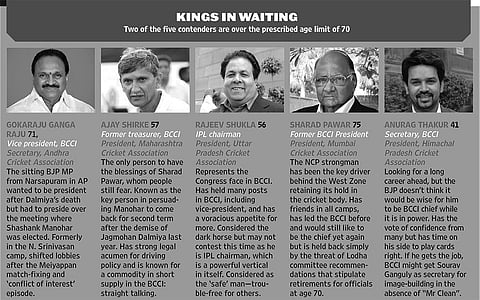Anurag Thakur has striven for long to be where he is now—one of the front-runners for the post of BCCI president following Shashank Manohar’s resignation. The BJP MP from Hamirpur in Himachal Pradesh has served with key people in the cricketing body as secretary and is close to Union finance minister Arun Jaitley, who is widely believed to be playing a backroom role in the ongoing legal tiff in India’s top court.
No Rest Days In The Dharamsala Test
How Anurag Thakur came from nowhere, kept all happy and positioned himself for the biggest crown
The Supreme Court will take its call on BCCI’s implementation of the Lodha committee recommendations on June 30. While many believe Thakur will be the next chief, what he does till the court’s ruling could well determine his future as a cricket administrator. With age on his side, Thakur, 41, is not openly gunning for the post, but reportedly met Jaitley hours after Manohar put in his papers.
Most board functionaries were happy to see Manohar go, following their displeasure over his recommendations to the ICC, many of which had originally been proposed by his predecessor N. Srinivasan. But with the BCCI sitting on a razor’s edge over what the SC has in store, the buzz is that Thakur will not immediately be installed as BCCI president. Besides, becoming board chief at a time when a reshuffle of the Narendra Modi team is in the air, with the panel’s recommendations expressly barring dual hats, can disturb Thakur’s political ambitions.
Sources indicate that the BCCI is likely to go in for stop-gap measures to maintain a sort of status quo till the SC ruling, since the CEO will be the functional head of the organisation from June 1. Besides, if the CAG has to scrutinise BCCI accounts and government nominees sit on the board—key recommendations of the Lodha panel to enhance accountability—other board members will squirm in discomfort. Thakur is likely to wait his turn; he has moved up gradually over nearly 15 years.
The uphill trek began around 2000, when, according to an observer, Thakur used to hang around with powers that be in Chandigarh, hoping for a spot in the old boys’ club. Inderjit Singh Bindra—then president of the Punjab Cricket Association—had kept him at bay as the former BCCI chief already had his coterie of ‘yes-men’ queuing for table scraps.

Thakur turned to the Himachal Pradesh Cricket Association (HPCA). The hill-state did not have much to offer to Indian cricket and controversial IPL founder Lalit Modi had bought his way into HPCA, which was controlled mostly by state-level Congress leaders. With his father Prem Kumar Dhumal as CM, Thakur railroaded Modi out of the state; took over the association after dethroning Congress netas, and declared himself the lifetime president of HPCA. He even threw in a first-class cricket match (in which he chose himself as the HP team captain), which helped him become a junior national selector. Thus began Thakur’s long journey into national-level cricket administration.
At the time, HPCA didn’t do much other than vote at the BCCI annual general meeting. Thakur managed to get a stadium built at pristine Dharamsala and other local work for cricket but his method and motives have been challenged in a vigilance probe, which Outlook reported last year. Thakur hotly denied all allegations. He even took a leaf out of BCCI vice-president Rajiv Shukla’s UPCA book and converted HPCA from a society to a not-for-profit company.
Then BCCI president Jagmohan Dalmiya noticed the young man who otherwise sat quietly in the back benches during meetings but was sharp and articulate when it was his turn to make a point. It is believed that while Dalmiya groomed Thakur about the niceties of cricket administration, the latter knew how to keep everyone happy. That Jaitley, a formidable force in the BCCI, was also a BJP member, helped Thakur get close to him.
Over the years, Thakur has maintained working relationships with whoever has been in power in the BCCI. Sports reporters say that he has also worked for the game at the grassroots level: providing opportunities here for Afghan cricketers; created infrastructure for small clubs in HP; come up with good ideas that help cricketers. He also tabled a bill for cricket—a concise version of the Justice Mukul Mudgal-drafted National Sports Development Bill and the Prevention of Sports Fraud Bill.
If the Lodha committee recommendations were to be enforced, Thakur might be stopped from serving the next term and things could change a lot in the intervening period. Besides, he would have to give up his post as lifetime president of the HPCA—his ticket to the BCCI.
Tags